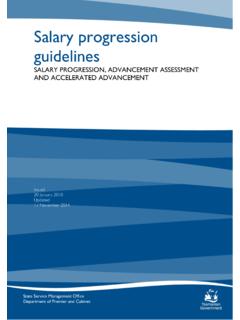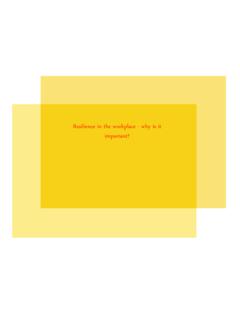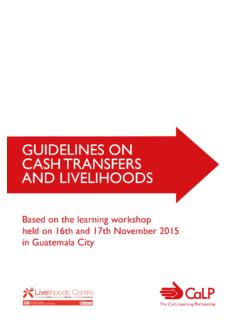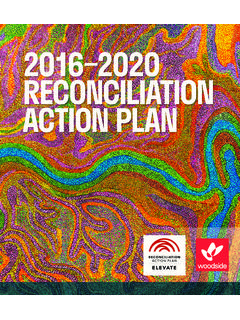Transcription of Behaviourally Based Questions
1 Page 1 of 25 Behaviourally Based Questions Index 1 HOW TO WRITE Behaviourally Based Questions Page 2 2 SAMPLE BEHAVIOURAL Questions Page 3 3 SAMPLE Behaviourally Based Questions FROM RIGHT JOB, RIGHT PERSON! CAPABILITY CARD SET Page 5 WRITTEN COMMUNICATION SKILLS Page 5 CLIENT SERVICE ORIENTATION Page 6 PROBLEM SOLVING Page 7 PROJECT MANAGEMENT Page 8 DECISION MAKING Page 9 PRESENTATION SKILLS Page 10 PERSUASION AND INFLUENCING SKILLS Page 11 LEADERSHIP SKILLS Page 12 STRATEGIC THINKING Page 13 CROSS CULTURAL AWARENESS Page 14 ORGANISATIONAL AWARENESS Page 15 BUSINESS FOCUS Page 16 VERBAL COMMUNICATION SKILLS Page 17 BUILDING PRODUCTIVE WORKING RELATIONSHIPS Page 18 TEAMWORK Page 19 FLEXIBILITY Page 20 DRIVE AND COMMITMENT Page 21 INITIATIVE Page 22 ETHICS AND VALUES Page 23 COACHING AND DEVELOPING OTHERS Page 24 RESILIENCE Page 27 Page 2 of
2 25 This guide should be used in conjunction with the Right Job, Right Person! Recruitment and Selection Framework, in particular Stage 3 Select. 1 HOW TO WRITE Behaviourally Based Questions Past behaviour is an excellent predictor of future behaviour. As a result, a structured behavioural interview can help to elicit valuable evidence about how someone is likely to perform in the role. In a behavioural interview we seek to find out what happened, and the role that the individual played in what happened. What did they actually do and experience? The Questions don t focus on the future, what might have happened, or on hypothetical scenarios. The other important aspect of Behaviourally Based Questions is a focus on behaviours that are going to be important for the role in question.
3 So what makes a question Behaviourally Based ? The first key to behavioural questioning is to ask about a specific situation. In this way you can probe for specific behaviours. Behavioural Questions start with phrases such as Tell me about a time when .. or Describe a situation where .. In both of these examples the interviewee is being asked to reflect on a particular event or situation. So, what makes an effective behavioural question response? Let s take the capability Initiative . An example of a Behaviourally Based question on initiative is: Give me a recent example of a time where you showed initiative. What were the circumstances? In what way did you show initiative? What was the outcome?
4 So, what kind of information would you look for from this question? Essentially, you want to understand to what extent the applicant has taken responsibility for their own actions and made decisions without referring to others. You would want to understand to what extent the applicant has acted on their own initiative in the past. Below is an example of a response to the question. A recent example was when my manager was suddenly taken ill and was in hospital. We had a project that needed to be progressed, and we couldn t contact here. The project need to be completed within a week, and it looked like my manager would not be back for a month.
5 The interviewer asks the first probe question. In what way did you show initiative? The applicant responds with: Well, I let my manager s manager (the group manager) know the situation regarding the project that it was something that we would need to complete in her absence. Before I did this, I checked to see what work had been done and what was left to do. The project had been scoped and documented, so this was quite easy to do. I discovered that there was still quite a bit of work that needed to be done in order to meet the project deadline. I suggested to the group manager that we could still get the project completed in time if we divided the rest of the work equally amongst the team.
6 Because I had been involved in the project right from the start, I volunteered to act as the project coordinator in my manager s absence. Then the interviewer asks a second probe question. What was the outcome? Page 3 of 25 The applicant responds with: Well I was really pleased. The project was finished to the deadline, and the internal client wasn t impacted. I also received special thanks from my manager when she returned and from the group manager. This is an effective answer. In evaluating the applicant s response, the interviewer checks back to the capability Initiative, especially the behavioural indicators. That is: proactive and self-starting seize opportunities and act upon them originate action and actively influence events.
7 As you can see, the responses provided by the applicant demonstrate strengths against each of the three behavioural indicators. Back to Index 2 SAMPLE BEHAVIOURAL Questions Introduction: The following sample Behaviourally Based Questions provide a guide for you when creating the main Questions to be used in a structured behavioural interview and/or referee check. The Questions you create should reflect the particular capabilities (selection criteria) required for the role. The sample Questions are constructed to be Behaviourally Based . Behavioural interviewing focuses on relevant situations that the applicant has been involved with in the past. They are designed to elicit from the applicant what they did in each situation and the role that the individual played in what happened.
8 This is Based on the premise that past behaviour is an excellent predictor of future behaviour. It is therefore important that the Behaviourally Based Questions focus on relevant behaviours (skills and personal qualities) that are going to be important for the role. Let s take the capability (personal quality) of Resilience . The first question is: Describe a situation in which you needed to work under pressure for a long period of time. The behavioural elements of the question are set out in bolder text below: Describe a situation in which you needed to work under pressure for a long period of time. Why Use the Sample Questions ? The sample Questions have been designed to assess each of the capabilities found on the Right Job, Right Person!
9 Capability Cards. The Capability Cards are grouped into personal qualities, skills and specific knowledge. A structured behavioural interview is an effective method for assessing personal qualities. Examples of these are: Building productive networks Flexibility Team work Drive and commitment Initiative Cross-cultural awareness Ethics and values Coaching and developing others Page 4 of 25 Resilience An interview is not as effective at assessing skills, problem solving, leadership skills and written communication skills. These are more appropriately assessed with ability tests, work sample tests and referee checks using Behaviourally Based Questions .
10 However, there may be situations where you are not able to use these methods. For this reason, sample interview Questions have also been provided for the skills cards. The same Questions will also provide you with a guide to constructing Questions for the referee check. A referee check is a more appropriate method for assessing the following skills: Problem solving Client service orientation Project management skills Decision making Persuasion and influencing skills Presentation skills Leadership skills Strategic thinking skills Business focus Organisational awareness Written communication skills Sample Questions have not been provided for the Specific Knowledge cards.












